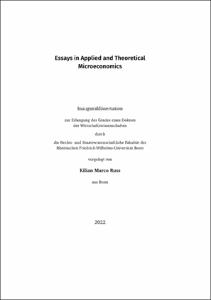Essays in Applied and Theoretical Microeconomics

Essays in Applied and Theoretical Microeconomics

| dc.contributor.advisor | Falk, Armin | |
| dc.contributor.author | Russ, Kilian Marco | |
| dc.date.accessioned | 2022-06-13T14:47:46Z | |
| dc.date.available | 2022-06-13T14:47:46Z | |
| dc.date.issued | 13.06.2022 | |
| dc.identifier.uri | https://hdl.handle.net/20.500.11811/9869 | |
| dc.description.abstract | Science is the discovery of knowledge. The process of this discovery is based on two ingredients: hypothesizing – often guided by theoretical abstraction and deductive reasoning – and testing in the form of empirical investigation and experimentation. The cadence of theoretical and empirical inquiry builds the cornerstone of today’s understanding of the natural world and has fueled remarkable scientific achievements. Modern economic research in many aspects strives to emulate these principles originally pioneered by the natural sciences.
Economists today seek not only a better understanding of the origins and consequences of individual and societal economic decision making, but frequently find themselves drawn upon to harness their insight and to provide evidence and recommendation for practical policy design. While our profession devotes considerable care in separating positive analysis from normative judgements it has become evident that sound evidence-based policy advice – much like science itself – stands on two pillars: theory and empirics. This thesis uses the toolkit of modern microeconomic analysis to contribute to three broad policy-relevant areas of economics: unemployment, immigration and voting. How should we design targeted unemployment insurance that mitigates some of the adverse consequences of job loss? What is the impact of immigration on productivity in the economy? And, are there better ways to organize collective decision making than voting by simple Majority rule? The content of this work is motivated by a deep belief that economic research stands to gain from a close integration of theoretical and empirical analysis. Accordingly, the work below draws on methods from applied microeconomic theory, sufficient statistics, quasi-experimental and observational methods, voting theory and mechanism design. | en |
| dc.language.iso | eng | |
| dc.rights | In Copyright | |
| dc.rights.uri | http://rightsstatements.org/vocab/InC/1.0/ | |
| dc.subject | Arbeitslosenversicherung | |
| dc.subject | Quasi-Experimentale Methoden | |
| dc.subject | Migration | |
| dc.subject | Produktivität | |
| dc.subject | Abstimmungsmechanismen | |
| dc.subject | Unemployment Insurance | |
| dc.subject | Tagging | |
| dc.subject | Bunching | |
| dc.subject | Immigration | |
| dc.subject | Productivity | |
| dc.subject | Voting | |
| dc.subject.ddc | 330 Wirtschaft | |
| dc.title | Essays in Applied and Theoretical Microeconomics | |
| dc.type | Dissertation oder Habilitation | |
| dc.publisher.name | Universitäts- und Landesbibliothek Bonn | |
| dc.publisher.location | Bonn | |
| dc.rights.accessRights | openAccess | |
| dc.identifier.urn | https://nbn-resolving.org/urn:nbn:de:hbz:5-66862 | |
| ulbbn.pubtype | Erstveröffentlichung | |
| ulbbnediss.affiliation.name | Rheinische Friedrich-Wilhelms-Universität Bonn | |
| ulbbnediss.affiliation.location | Bonn | |
| ulbbnediss.thesis.level | Dissertation | |
| ulbbnediss.dissID | 6686 | |
| ulbbnediss.date.accepted | 27.04.2022 | |
| ulbbnediss.institute | Rechts- und Staatswissenschaftliche Fakultät / Fachbereich Wirtschaftswissenschaften : Institut für angewandte Mikroökonomik | |
| ulbbnediss.fakultaet | Rechts- und Staatswissenschaftliche Fakultät | |
| dc.contributor.coReferee | Spinnewijn, Johannes | |
| ulbbnediss.contributor.gnd | 1262907241 |
Files in this item
This item appears in the following Collection(s)
-
E-Dissertationen (288)




